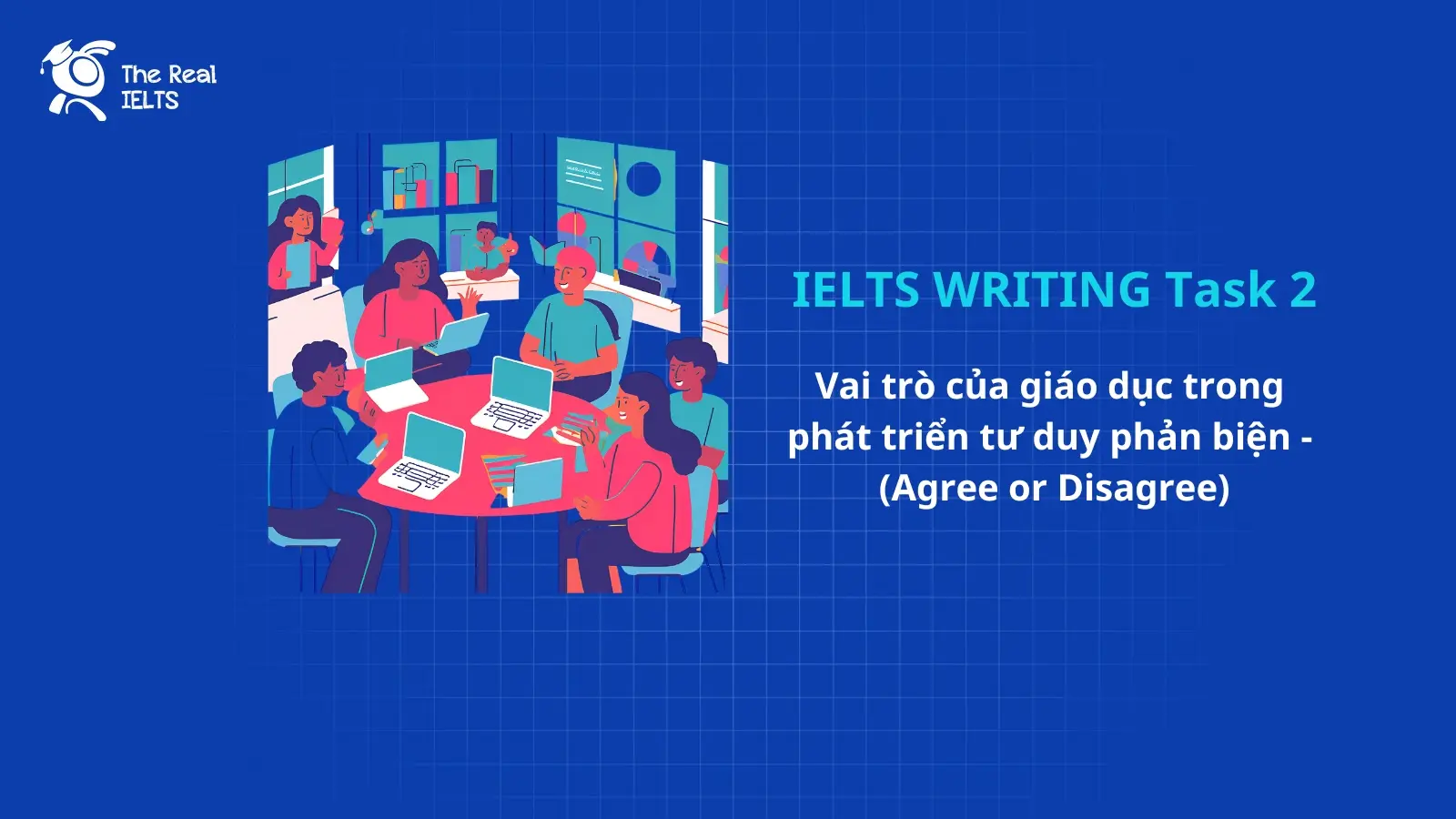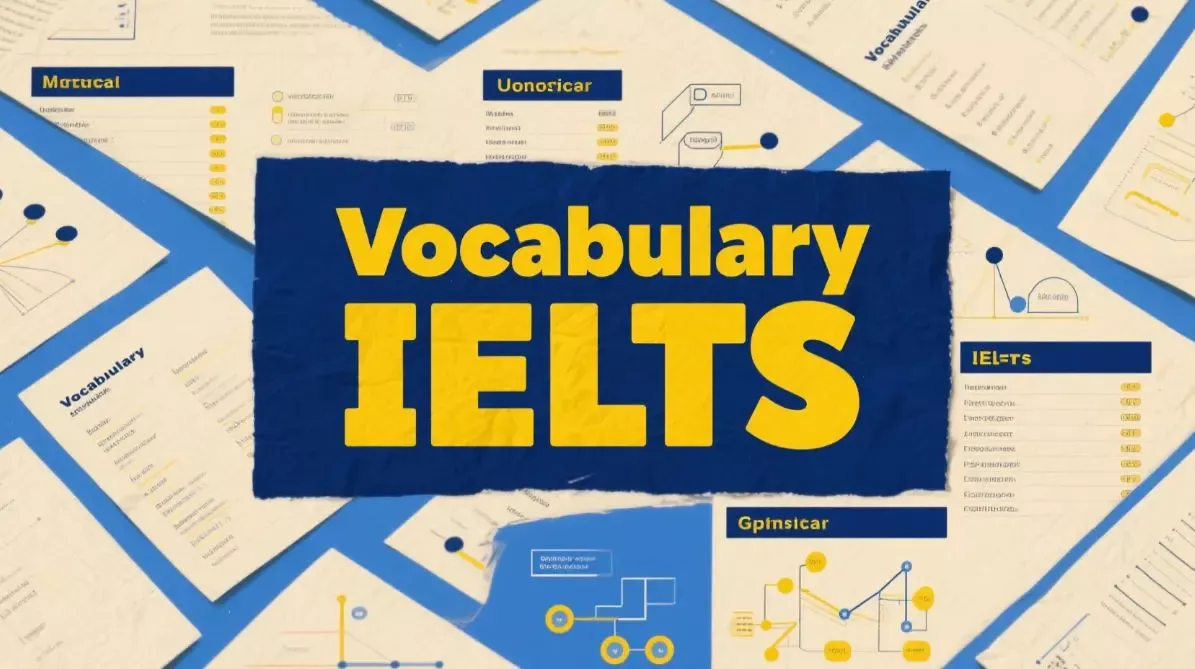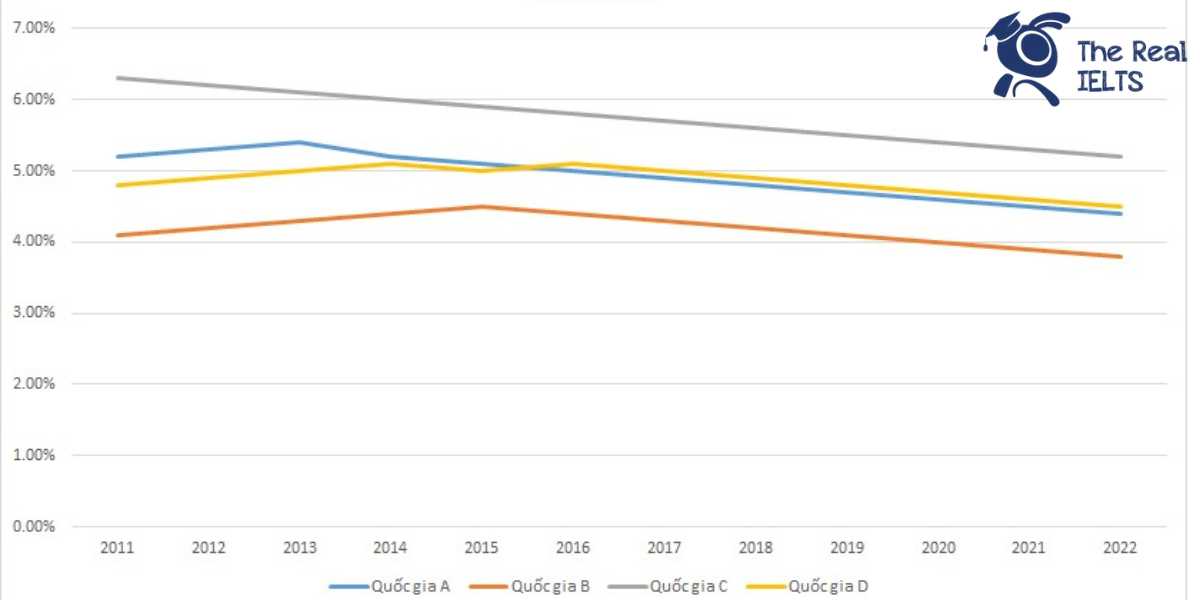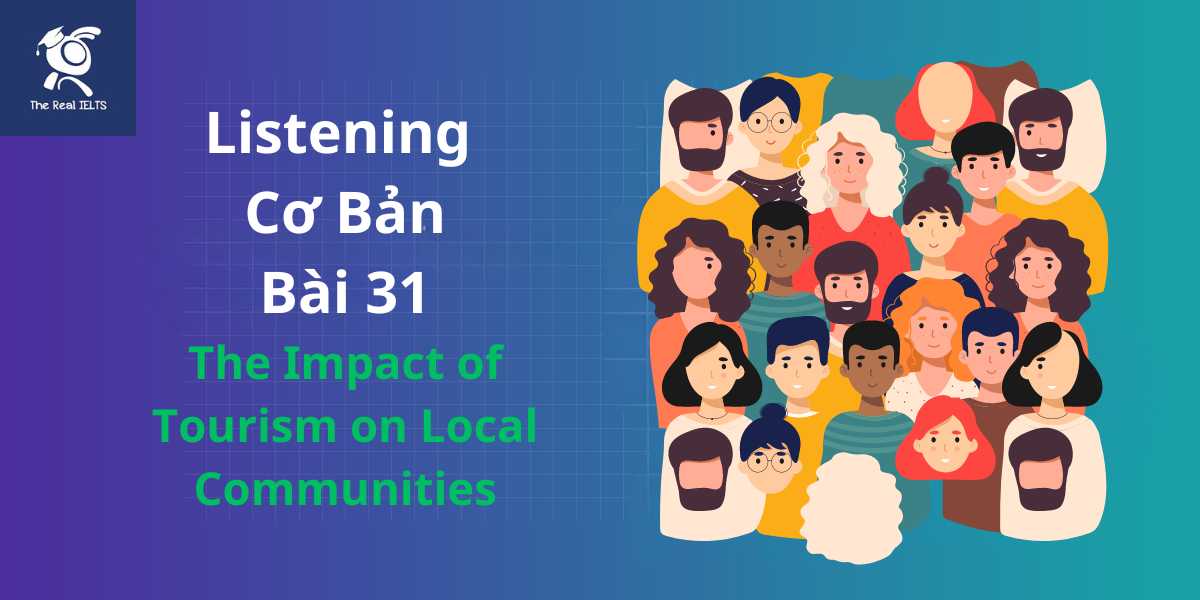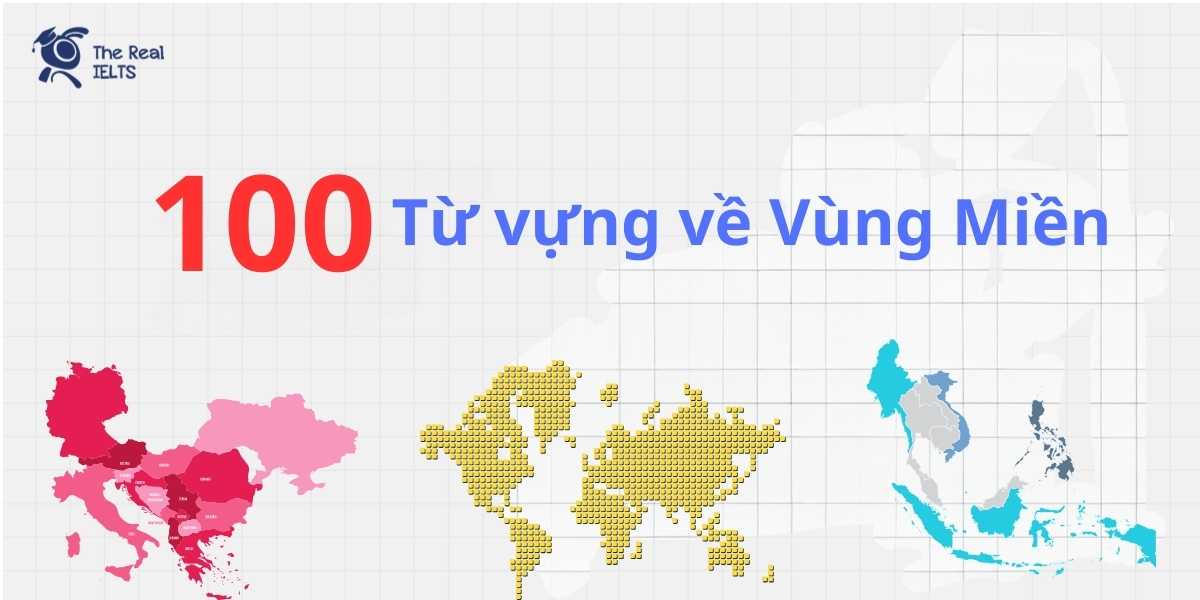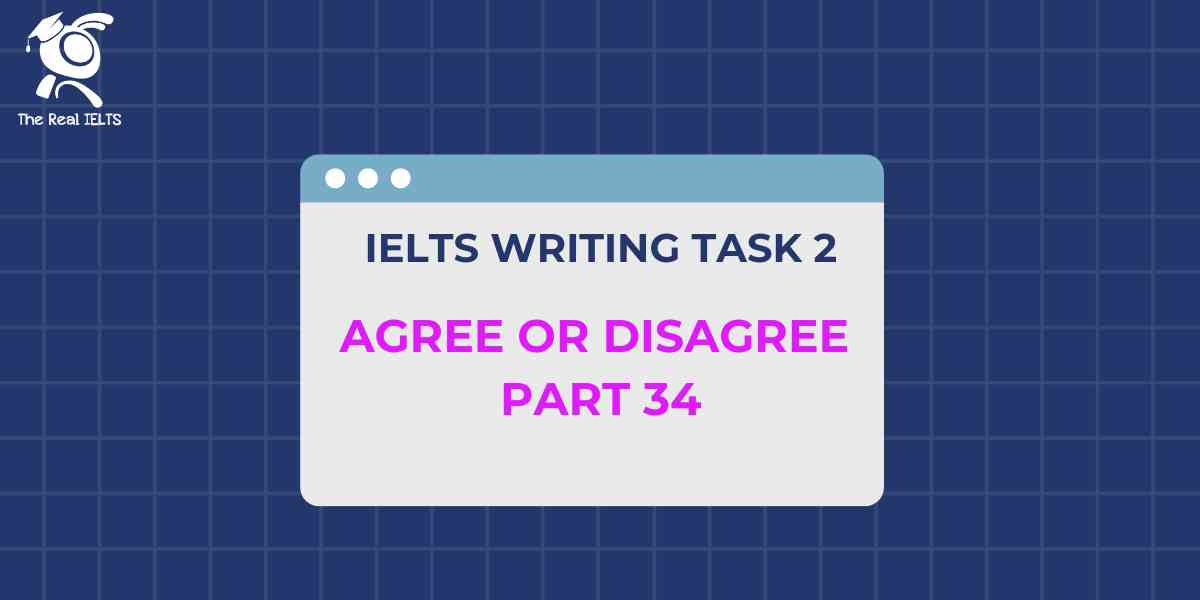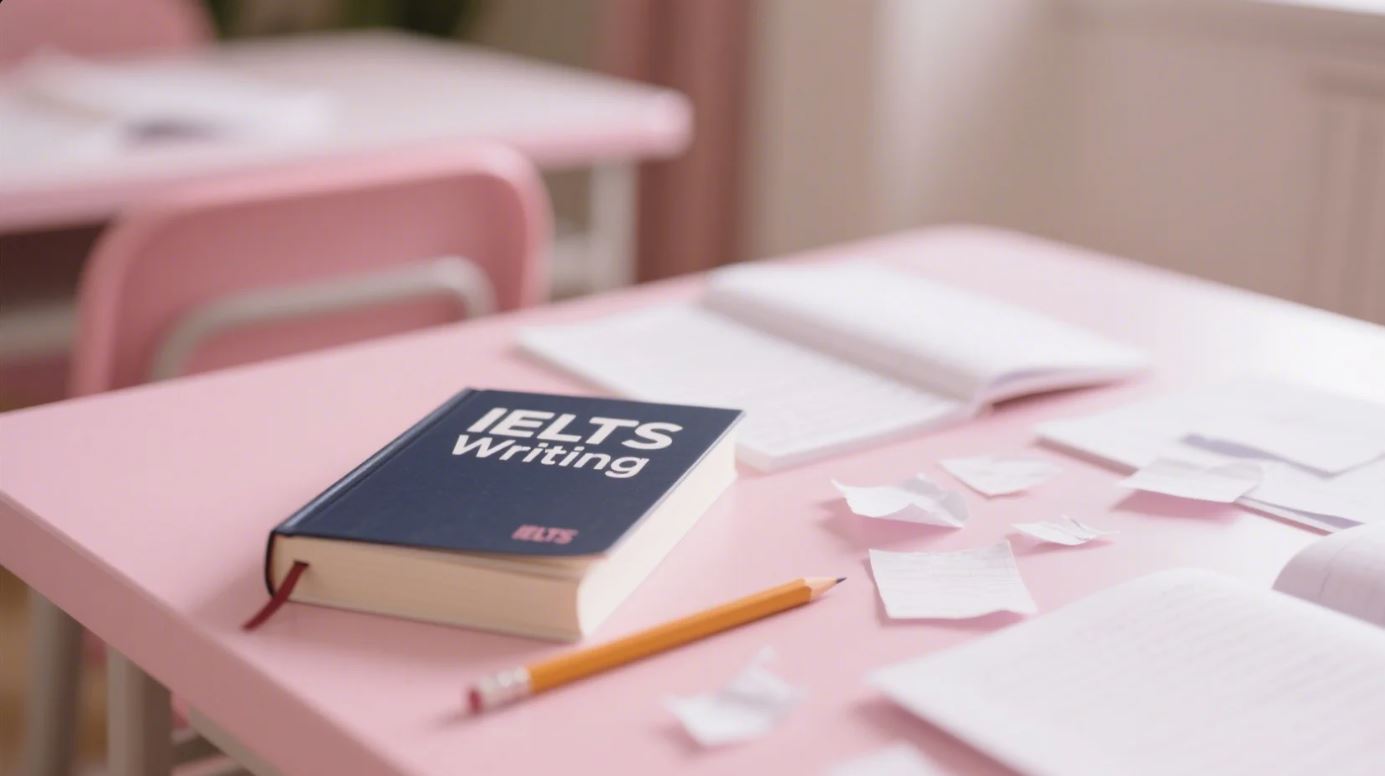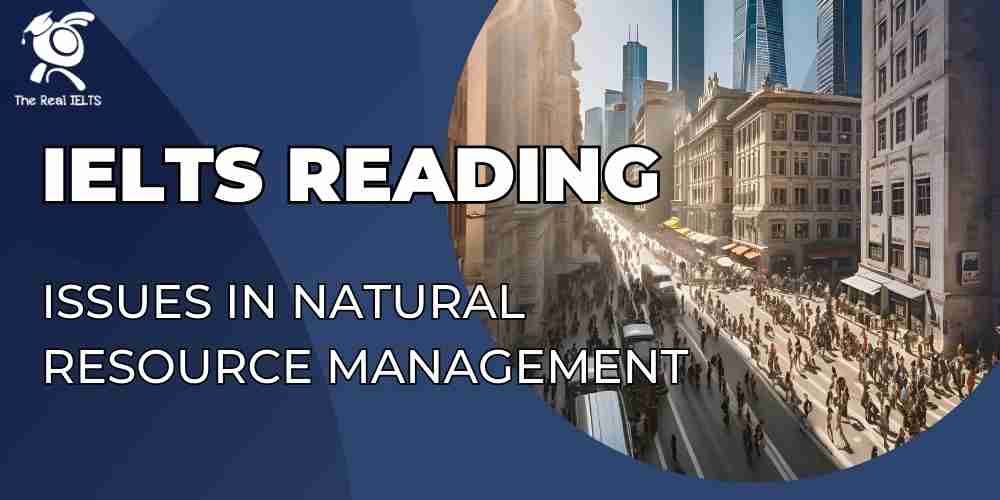IELTS Writing Task 2 thường đề cập đến các chủ đề quan trọng như vai trò của giáo dục trong phát triển tư duy phản biện. Nhiều ý kiến cho rằng giáo dục giúp học sinh nâng cao khả năng phân tích và đánh giá thông tin. Vậy liệu điều này có hoàn toàn đúng? Bài viết sau sẽ phân tích quan điểm này.
Đọc thêm: IELTS Writing Task 2: Giáo dục ảnh hưởng đến thu nhập như thế nào? – Two-part Question Essay
Đề bài IELTS Writing Task 2: Vai trò của giáo dục trong phát triển tư duy phản biện – Agree or Disagree
“Education plays a crucial role in developing critical thinking skills.” To what extent do you agree or disagree?
Ví dụ 1
Introduction
Education is widely regarded as a fundamental tool for shaping individuals’ cognitive abilities, particularly in fostering critical thinking skills. While some argue that education alone cannot fully develop such skills, I strongly agree that a well-designed education system plays a crucial role in enhancing critical thinking.
Body Paragraph 1: Education as a Foundation for Critical Thinking
A structured education system provides students with essential analytical skills and problem-solving techniques. Subjects like mathematics, science, and philosophy encourage learners to evaluate information, question assumptions, and form logical conclusions. For instance, students engaged in debates or case studies are trained to assess multiple perspectives before making informed decisions. Without formal education, individuals may struggle to develop these cognitive skills systematically.
Body Paragraph 2: Teaching Methods That Promote Critical Thinking
Modern teaching methodologies, such as inquiry-based learning and Socratic questioning, further enhance students’ ability to think critically. These methods encourage active participation, self-reflection, and independent reasoning. For example, project-based learning requires students to analyze real-world problems and propose effective solutions, fostering deeper understanding rather than rote memorization. Consequently, education plays a direct role in cultivating intellectual autonomy.
Body Paragraph 3: Limitations and Other Contributing Factors
However, it is important to acknowledge that critical thinking is not solely dependent on formal education. Parental guidance, social interactions, and life experiences also contribute significantly to cognitive development. Moreover, some traditional education systems emphasize rote learning over analytical skills, limiting students’ ability to think independently. Thus, while education is a vital factor, it must be complemented by other influences to maximize its effectiveness.
Conclusion
In conclusion, education serves as a key driver in developing critical thinking skills by providing structured learning, fostering analytical reasoning, and employing effective teaching strategies. Nevertheless, external factors also play a role, and educational systems must continuously evolve to prioritize critical thinking over passive knowledge acquisition.
Ví dụ 2
Education is often regarded as the foundation for intellectual growth, and one of its most significant contributions is the development of critical thinking skills. While some argue that critical thinking can be acquired through life experiences and independent learning, I strongly agree that formal education plays a crucial role in fostering this ability.
Firstly, structured education provides a systematic approach to developing critical thinking. Schools and universities expose students to diverse subjects, encouraging them to analyze information, evaluate different perspectives, and form reasoned arguments. Subjects such as philosophy, science, and literature require students to question assumptions, assess evidence, and engage in logical reasoning. For instance, scientific education emphasizes hypothesis testing and problem-solving, both of which are essential components of critical thinking.
Moreover, the academic environment promotes intellectual discourse, which is essential for sharpening critical thinking skills. Classroom discussions, debates, and research projects challenge students to think beyond memorization and develop independent thought processes. Teachers also play a pivotal role in guiding students toward analytical thinking by encouraging them to justify their opinions and defend their viewpoints with logical reasoning.
However, it is also true that critical thinking can be cultivated outside formal education. Real-world experiences, exposure to different cultures, and self-directed learning through books or online resources can also contribute significantly to one’s analytical abilities. Nevertheless, without the structured approach provided by education, individuals may struggle to refine their reasoning skills systematically.
In conclusion, while life experiences can also develop critical thinking, formal education remains a primary driver in honing this skill. Through structured learning, exposure to diverse perspectives, and intellectual engagement, education provides individuals with the necessary tools to think critically and make informed decisions. Therefore, I strongly believe that education plays a crucial role in shaping analytical and reasoning abilities.
Ví dụ 3
Introduction
Education is often regarded as a fundamental tool for developing critical thinking skills, which enable individuals to analyze information, solve problems, and make informed decisions. While some argue that education plays a crucial role in fostering these abilities, others believe that critical thinking is shaped by personal experiences, independent learning, and social interactions. This essay discusses both perspectives and provides a personal viewpoint on the issue.
Arguments Supporting the Role of Education in Critical Thinking
- Structured Learning Enhances Logical Reasoning:
- Formal education exposes students to problem-solving exercises, debates, and analytical tasks that encourage logical reasoning.
- Subjects like mathematics, science, and philosophy require critical thinking to evaluate evidence, form arguments, and draw conclusions.
- Encourages Questioning and Independent Thought:
- A well-designed education system teaches students to question assumptions, analyze multiple viewpoints, and develop their own perspectives.
- Research-based learning, essays, and projects help learners assess information critically rather than accepting ideas at face value.
- Exposure to Diverse Knowledge and Perspectives:
- Schools and universities introduce students to different cultures, ideologies, and historical contexts, fostering open-mindedness and critical analysis.
- Discussions and group activities challenge individuals to defend their opinions and consider alternative viewpoints.
- Develops Problem-Solving and Decision-Making Skills:
- Subjects like economics, law, and psychology teach students to evaluate real-world issues using logical frameworks.
- Case studies and simulations encourage students to apply knowledge in practical situations, improving their analytical abilities.
Counterarguments: Other Influences on Critical Thinking
- Personal Experience and Self-Directed Learning:
- Critical thinking can also be developed through life experiences, self-study, and exposure to real-world challenges.
- Independent reading, online resources, and discussions outside formal education can shape one’s ability to think critically.
- Cultural and Social Environment:
- Family upbringing, peer interactions, and societal influences play a significant role in shaping an individual’s reasoning abilities.
- Some people develop strong critical thinking skills despite limited formal education through exposure to diverse perspectives in their communities.
- Education Systems May Limit Independent Thinking:
- In some cases, rigid educational structures emphasize memorization and standardized testing over creativity and analytical skills.
- Traditional teaching methods that focus on rote learning rather than inquiry-based learning may not effectively foster critical thinking.
Personal Opinion
While personal experiences and independent learning contribute to critical thinking, formal education plays a crucial role in its structured development. Schools and universities provide a systematic approach to reasoning, problem-solving, and decision-making that many individuals may not acquire on their own. However, for education to be truly effective in enhancing critical thinking, it must prioritize inquiry-based learning, open discussions, and analytical exercises rather than rote memorization.
Conclusion
Education is a powerful tool for developing critical thinking skills, as it provides structured learning experiences, exposure to diverse viewpoints, and problem-solving opportunities. However, external factors such as personal experiences, self-learning, and societal influences also play a role. To maximize the benefits of education in fostering critical thinking, schools should emphasize active learning, creativity, and open dialogue rather than just information retention.
Ví dụ 4
Introduction
Education is often regarded as a key factor in developing critical thinking skills, which enable individuals to analyze, evaluate, and solve problems effectively. Some argue that formal education is essential for nurturing these skills, while others believe that critical thinking can be acquired through real-life experiences. This essay will discuss both perspectives before presenting my own view.
Reasons to Agree: Education Enhances Critical Thinking
- Structured Learning and Analytical Thinking – Education provides a systematic approach to problem-solving, helping students analyze information logically and make informed decisions.
- Exposure to Diverse Perspectives – Schools and universities encourage discussions, debates, and exposure to different viewpoints, which enhance critical thinking abilities.
- Development of Research and Evaluation Skills – Through assignments, projects, and academic research, students learn to assess the credibility of sources and construct well-reasoned arguments.
- Encouragement of Questioning and Inquiry – Education fosters curiosity by encouraging students to ask questions, challenge assumptions, and seek deeper understanding.
Reasons to Disagree: Other Factors Contribute to Critical Thinking
- Real-World Experiences Matter – Many individuals develop critical thinking through practical experiences, such as problem-solving in the workplace or making independent decisions in daily life.
- Education Systems May Emphasize Rote Learning – In some countries, traditional education focuses on memorization rather than critical analysis, limiting students’ ability to think independently.
- Self-Learning and Informal Education – People can develop critical thinking through reading, engaging in discussions, and learning from real-world interactions outside formal education.
- Creativity and Innovation Can Develop Outside Academia – Many successful entrepreneurs and problem-solvers cultivate critical thinking through trial and error rather than formal education.
My Opinion
While education plays a significant role in fostering critical thinking, it is not the only way to develop these skills. A well-designed education system that encourages inquiry and analysis can greatly enhance critical thinking, but practical experiences and self-learning are equally important. Therefore, I believe that education is a major contributor, but not the sole determinant, of critical thinking skills.
Conclusion
Education provides valuable tools for developing critical thinking, but its effectiveness depends on the teaching approach. Real-world experiences, informal learning, and independent thinking also contribute significantly. A balanced combination of education and practical experience is the best way to develop strong critical thinking skills.
Ví dụ 5
Critical thinking is the ability to analyze, evaluate, and interpret information objectively to make reasoned decisions. Many argue that education plays a crucial role in fostering this skill, while others believe that critical thinking is more influenced by personal experiences and real-world problem-solving. This essay will examine both perspectives before presenting my own view.
The Role of Education in Developing Critical Thinking
- Structured Learning and Logical Reasoning
Formal education exposes students to structured learning, where they engage in logical reasoning, problem-solving, and analytical discussions. Subjects such as mathematics, science, and philosophy encourage students to evaluate evidence, identify patterns, and draw conclusions. - Exposure to Diverse Perspectives
Schools and universities provide an environment where students encounter different viewpoints through discussions, debates, and literature. Exposure to contrasting opinions helps individuals question assumptions and develop independent thought. - Research and Inquiry-Based Learning
Higher education, in particular, emphasizes research, requiring students to gather information, assess sources, and form well-reasoned arguments. This process nurtures critical thinking by encouraging skepticism and deep analysis. - Application of Theoretical Knowledge
Many academic fields require students to apply theoretical knowledge to real-world problems. Case studies, simulations, and problem-based learning in disciplines such as business, medicine, and law enhance the ability to think critically.
Limitations of Education in Developing Critical Thinking
- Memorization-Based Learning
In some education systems, there is an overemphasis on rote memorization rather than analytical thinking. Standardized tests often prioritize factual recall over problem-solving, limiting opportunities for students to develop critical thinking skills. - Real-World Experience and Adaptability
Critical thinking is also shaped by real-life experiences, workplace challenges, and social interactions. Many practical skills, such as decision-making in unpredictable situations, are best learned outside of the classroom. - Influence of Personal and Cultural Factors
Family upbringing, personal experiences, and cultural background also play a role in shaping how individuals think critically. Some people develop strong analytical skills through self-learning, curiosity, and exposure to diverse environments rather than formal education alone.
Personal Opinion
While education plays a significant role in fostering critical thinking, it is not the sole determining factor. The effectiveness of education in developing this skill depends on the teaching methods used and the willingness of students to engage in independent thought. A combination of formal education, practical experience, and self-driven learning is the best approach to nurturing critical thinking abilities.
Conclusion
In conclusion, education provides a strong foundation for critical thinking through structured learning, research, and exposure to different perspectives. However, its effectiveness can be limited by rigid curricula and memorization-based teaching methods. To truly develop critical thinking skills, individuals should complement formal education with real-world experiences, self-reflection, and continuous learning.
Ví dụ 6
Introduction
Education is often regarded as a fundamental tool for developing critical thinking skills, enabling individuals to analyze, evaluate, and solve problems effectively. While formal education fosters critical thinking through structured learning, some argue that real-world experiences and independent reasoning also play a significant role. This essay will examine both perspectives before presenting a reasoned conclusion.
Arguments in Favor of Education Developing Critical Thinking
- Exposure to Diverse Perspectives – Education introduces students to various ideas, cultures, and viewpoints, encouraging them to analyze and compare different perspectives before forming their own opinions. Subjects like philosophy, literature, and social sciences particularly enhance critical thinking by promoting debate and discussion.
- Structured Problem-Solving Approaches – Many academic disciplines, especially mathematics, science, and logic-based subjects, require students to engage in analytical reasoning and systematic problem-solving. This process trains individuals to assess evidence, question assumptions, and think logically.
- Encouragement of Inquiry and Research – Higher education, especially at the university level, emphasizes independent research, requiring students to evaluate sources, develop arguments, and defend their conclusions. This process strengthens their ability to think critically and assess information objectively.
- Development of Communication and Argumentation Skills – Writing essays, participating in debates, and engaging in group discussions in educational settings help students articulate their thoughts clearly and defend their viewpoints with reasoned arguments.
Arguments Against Education as the Sole Source of Critical Thinking
- Practical Experience and Independent Thinking Matter – Critical thinking is not solely developed in classrooms. Real-world experiences, such as problem-solving in the workplace, making financial decisions, or navigating social relationships, also contribute significantly to an individual’s ability to think critically.
- Memorization-Based Education Systems – In some educational settings, rote learning is emphasized over critical analysis. Students may be required to memorize information rather than engage in deep thinking, limiting their ability to develop true critical reasoning skills.
- Self-Learning and Informal Education – Many individuals develop critical thinking skills through self-learning, exposure to media, books, and online resources. Some of the most innovative thinkers in history were self-taught and relied on curiosity and experimentation rather than formal education.
Conclusion
While education plays a crucial role in developing critical thinking by exposing individuals to diverse perspectives, structured problem-solving, and research-based learning, it is not the only factor. Practical experiences, self-learning, and independent reasoning also contribute significantly to critical thinking. Therefore, while education is an essential tool in fostering analytical skills, real-world application and lifelong learning are equally important in fully developing critical thinking abilities.
Ví dụ 7
Education is often regarded as a fundamental tool for developing critical thinking skills, enabling individuals to analyze information, solve problems, and make informed decisions. While formal education plays a significant role in fostering these abilities, some argue that real-world experiences and independent learning also contribute substantially.
Why Education Enhances Critical Thinking
- Structured Learning Environment – Schools and universities encourage students to engage in debates, analyze case studies, and solve complex problems, all of which promote critical thinking.
- Exposure to Diverse Perspectives – Education introduces individuals to different viewpoints, cultures, and ideologies, helping them evaluate information objectively and develop well-reasoned opinions.
- Research and Inquiry-Based Learning – Higher education emphasizes research, requiring students to question assumptions, assess evidence, and form logical conclusions.
- Development of Problem-Solving Skills – Subjects such as mathematics, science, and philosophy train students to approach challenges methodically and think critically about solutions.
- Encouragement of Analytical Reasoning – Educators often use critical discussions, essays, and analytical tasks to help students refine their reasoning and decision-making skills.
Limitations of Formal Education in Developing Critical Thinking
- Rigid Curriculums – Some education systems prioritize rote memorization over analytical reasoning, limiting students’ ability to think independently.
- Lack of Practical Application – While education provides theoretical knowledge, critical thinking often improves through real-world experiences, challenges, and hands-on problem-solving.
- Influence of Social and Cultural Factors – Critical thinking is also shaped by an individual’s environment, upbringing, and personal experiences outside formal education.
- Self-Directed Learning and Adaptability – Many individuals develop critical thinking through personal exploration, online learning, and exposure to new ideas beyond academic settings.
Conclusion
While formal education plays a crucial role in developing critical thinking, it is not the sole factor. Independent learning, real-life experiences, and exposure to diverse perspectives are equally important. Therefore, a well-balanced approach that combines structured education with experiential learning is the most effective way to cultivate strong critical thinking skills.
Ví dụ 8
Education is often credited with fostering critical thinking skills, as it encourages individuals to analyze information, solve problems, and make informed decisions. However, some argue that traditional education systems focus more on rote memorization than on developing independent thought. This essay will examine both perspectives before concluding that education plays a crucial, though not absolute, role in enhancing critical thinking.
On the one hand, formal education helps develop critical thinking by exposing students to diverse perspectives and problem-solving techniques. Subjects such as science, mathematics, and philosophy require students to analyze data, evaluate arguments, and draw logical conclusions. Furthermore, higher education, particularly university-level studies, encourages research, debate, and independent inquiry, all of which strengthen critical thinking abilities.
Moreover, education provides structured learning environments where individuals can question assumptions and develop reasoning skills. Many modern education systems emphasize project-based learning, discussions, and case studies, which require students to think critically rather than simply memorize facts. This approach helps learners apply their knowledge to real-world situations, improving their analytical and decision-making skills.
On the other hand, some critics argue that traditional education systems do not always prioritize critical thinking. In many countries, standardized testing and rigid curricula place greater emphasis on memorization rather than independent analysis. As a result, students may excel in exams but struggle to think creatively or critically when faced with complex challenges. Additionally, the effectiveness of education in developing critical thinking depends on teaching methods and the willingness of educators to encourage open discussions and diverse viewpoints.
In my opinion, education plays a vital role in fostering critical thinking, but its impact depends on the quality of teaching and learning methods. While some systems successfully nurture analytical skills, others may still rely too heavily on rote learning. To maximize the benefits of education, schools and universities should adopt interactive and inquiry-based learning approaches that encourage students to question, evaluate, and think independently.
Conclusion
Education is an important tool for developing critical thinking skills, as it exposes individuals to logical reasoning, problem-solving techniques, and diverse viewpoints. However, its effectiveness varies depending on teaching methods and curriculum design. By promoting discussion-based learning and reducing reliance on rote memorization, education systems can better equip students with the ability to think critically in all aspects of life.
Ví dụ 9
Education is often regarded as a fundamental tool for developing critical thinking skills, as it encourages individuals to analyze information, solve problems, and make informed decisions. While some believe that formal education is the primary driver of critical thinking, others argue that real-world experiences and independent learning also play significant roles. This essay will discuss both perspectives before presenting my own view.
On the one hand, formal education plays a vital role in shaping critical thinking abilities. Schools and universities encourage students to question assumptions, evaluate evidence, and form logical arguments. For example, subjects like science, mathematics, and philosophy require students to analyze data, compare theories, and draw reasoned conclusions. Furthermore, academic settings promote discussions, debates, and research-based learning, all of which enhance analytical skills. Additionally, exposure to diverse viewpoints in educational institutions helps individuals develop open-mindedness and problem-solving abilities, which are essential for critical thinking.
On the other hand, some argue that education alone is not enough to develop critical thinking. Real-world experiences, such as working in a professional environment, traveling, or engaging in social interactions, can also enhance one’s ability to think critically. For instance, entrepreneurs and self-taught professionals often develop problem-solving skills through hands-on experiences rather than formal education. Moreover, some traditional education systems focus heavily on rote memorization rather than analytical thinking, limiting the extent to which students develop independent reasoning skills.
In my opinion, while education is a crucial factor in fostering critical thinking, it is not the sole determinant. A well-rounded approach that includes real-world experiences, independent learning, and exposure to diverse perspectives is necessary for individuals to fully develop critical thinking abilities. Therefore, education should emphasize not only theoretical knowledge but also practical applications to maximize its impact on critical thinking skills.


